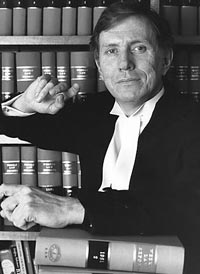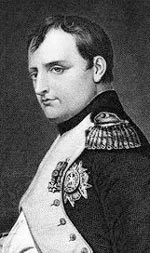Tulk would hire Kirby at the Pearly Gates
 Tulkinghorn •
Tulkinghorn •  Friday, September 3, 2010
Friday, September 3, 2010 Michael Kirby swaps horses on our justice system ... When it operates, it operates very well ... How often might that be? ... Former High Court judge says there are not enough lawyers in politics ... Tulkinghorn thinks Kirby might have lost it  When I arrive at the Pearly Gates I'm going to ask for an adversarial trial (as opposed to an inquisitorial one).
When I arrive at the Pearly Gates I'm going to ask for an adversarial trial (as opposed to an inquisitorial one).
However, it would be foolish to ask for that directly. I'll fight for "adversarialism" in the usual manner employed by common lawyers.
My opening argument will be that I am entitled to a "fair trial".
Once I get St Peter to agree to that (and how can he be seen to disagree?) then, and only then, will I start arguing what a "fair trial" is.
My version will call for truth suppression (I am going to need lots of that) and with a bit of luck I'll be able to import a "right to silence".
I'll have to thwart God's "all seeing" capacity with rules about "improperly obtained evidence", and if St Peter starts saying that a search for truth must take precedence over "due process" concerns, I'll get him squirming by snide references to Tomas de Torquemada.  I'll also need a "good lawyer", assuming I am allowed one.
I'll also need a "good lawyer", assuming I am allowed one.
While some might say that calls for an expert in casuistry ("specious or excessively subtle reasoning intended to rationalize or mislead").
I think that standard lawyer advocacy skills should suffice.
As for my choice of counsel - until a few weeks ago, I would not have chosen former Justice Kirby.
In 1980 when he was president of the Australian Law Reform Commission he appeared (to me) to have a good handle on what was wrong with adversarialism.  Kirby - flippedI assumed he wouldn't support it. He told the Melbourne Rotary Club that the adversary system was a remnant of the medieval trial by ordeal, but was still central to the English way of doing justice. He said:
Kirby - flippedI assumed he wouldn't support it. He told the Melbourne Rotary Club that the adversary system was a remnant of the medieval trial by ordeal, but was still central to the English way of doing justice. He said:
"Under the adversary trial system, the judge does not take on the function, as he does in Europe, himself to search out the truth of the matter, to find the facts, to ask many questions and to take an active role in resolving the dispute...
The judge's role is that of a passive umpire in a furious game, whose sole function is occasionally to blow the whistle when there is a foul and to restart the match and then to take no part in it, nor to tell the players how to play."
He referred to "verbal pugilism" and to the respected English judge Lord Devlin, who, according to Kirby, said there should be less emphasis on winning the case and greater stress on dispassionately finding the truth of the matter.
Kirby was so enthused that he said that the ALRC would extend its then current inquiry (into the evidence law used in federal courts) to an examination of "the centrepiece of our legal system, the adversary trial itself".
I don't know what happened at the ALRC after that. Nothing much, I expect.
The legal profession will never willingly co-operate in proper reform of the adversarial system.
Adversarialism is the goose that lays all the litigational golden eggs. My imagination pictures a hot potato being chucked from hand to hand before being dumped down the nearest drain.
Last month, on August 13, a video of Kirby being interviewed by Jane Hutcheon was played on ABC TV24 on the One Plus One program.
This interview is why I would now call on Kirby to promote my preference for adversarialism at the Pearly Gates. Kirby is now a rampant adversarialist.
Early on in the interview, Kirby saw fit, pretty much unilaterally, to drape the High Court in virtue (to set the right sort of tone, I guess) when referring to the Communist Party case, where the court held "you couldn't ban the Communist Party".
Free speech for communists. Kirby said it was a "marvellous decision".
He didn't mention the Dunbabin case where the High Court thrashed The Age newspaper and its editor with heavy fines for contempt for suggesting the High Court judges were behaving like the "Little Brothers of the Soviet and kindred intelligentsia" would want them to, etc.
No free speech for that. The Age had written very mild stuff, and it can be read here.
The High Court said the newspaper was being "sarcastic", and that seemed to be enough.
After Kirby had finished his propagandising for the High Court, Hutcheon asked him:
"In Australia, and Britain and the US we have an adversary justice system dominated by lawyers. A recent book by Evan Whitton on this subject suggests more innocent people go to jail and far fewer guilty people go to jail under this system. Would you agree with that?"
Kirby didn't want to talk about that, so he didn't. Instead he said:
"I think our system is actually the best system because it is a system that keeps the state under control."
 N. Bonaparte - inquisitorialistIt would be churlish to suggest that perhaps we should be focussing on keeping the criminals under control.
N. Bonaparte - inquisitorialistIt would be churlish to suggest that perhaps we should be focussing on keeping the criminals under control.
Kirby slotted in a bit of the Torquemada stuff, but in a subtle way. The French [inquisitorial] system, "was devised by Napoleon, after all".
Then he adopted another common ploy: there is no need to worry about the adversarial/inquisitorial divide because "both systems can learn from each other and they're tending to merge because of globalism".
On this one take your pick. Kirby, or someone more eminently qualified to speak on the subject.
High Court Justice Susan Keifel said in 1999:
"Are the German (and other civilian) courts then to be taken as moving closer to common law procedures? Fundamentally, I think not." (1999 18 Australian Bar Review, page 173 at 174.)
Kirby came up with this:
"Don't knock our system. When it operates it operates very well."
What is one supposed to make of that?
Soon the gloves came off. On Kirby's side, anyway. He started talking about Hutcheon's "anti-lawyer" attitude.
"If you want to attack lawyers go out there and get another journalist to comment. I won't attack lawyers. I know that lawyers work very hard, they are important ingredients of the justice system."
That's the problem. They are overly important.
At this point Kirby seems to have totally lost it.
When asked if there were too many lawyers in government, he said that he didn't think there were enough.
In 2005 The Law Report (ABC, Radio National) put a reporter in the Queen Street Mall who asked people what they thought of lawyers who become politicians.
Two people replied along the lines of: "Even less."









Reader Comments